|
The 94 year old Hampton
was one of the most extraordinary musicians of the 20th century whose
artistic achievements symbolize the impact that jazz music has had on our
culture in the 21st century.
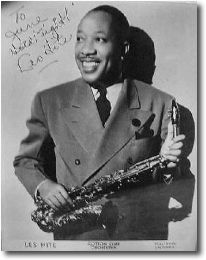 The
gifted bandleader and storied showman who was one of the most celebrated
musicians of the 20th century was born April 20, 1908 in Louisville, Kentucky. The
gifted bandleader and storied showman who was one of the most celebrated
musicians of the 20th century was born April 20, 1908 in Louisville, Kentucky.
The son of Charles Hampton, a
promising young pianist and singer who was reported missing and later declared
killed in World War I. The tragedy forced the young Lionel and his mother
Gertrude to join her family in Birmingham,
Alabama.
Lionel and his mother then later settled
in Chicago and he was sent to Kenosha, Wisconsin, where he attended the Holy
Rosary Academy for a short while. It was there that a Dominican nun give
him his first drum lessons.
After moving back to
Chicago, the future American musical treasure then attended St. Monica's
School. It was there where he heard about the Chicago Defender's
Newsboys Band. Lionel quickly complied with the criteria for joining the
band and signed up for a job selling papers for the black owned news company who also sponsored the band. In the beginning, he helped carry the bass drum, and later played the snare drum.
While still in high school, Lionel got a
job in a teenage band with Les Hite. The 15-year-old Hampton,
who had just graduated from high school, promised his grandmother he would
continue to say his daily prayers and was off to a bright and promising future.
Leaving for Los Angeles to join Reb Spikes's Sharps and
Flats and Paul Howard's Quality Serenaders as
well as a new band organized by Hite, which backed Louis
Armstrong at the Cotton Club.
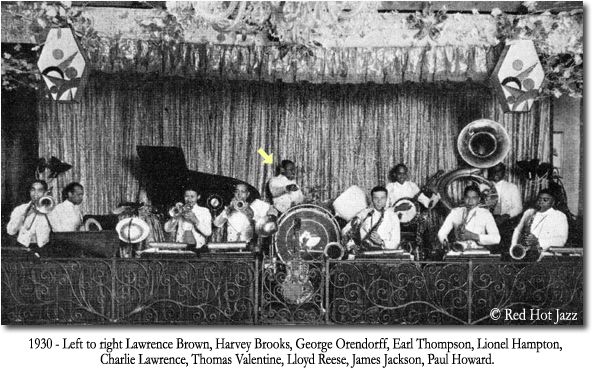
Over Night
Blues

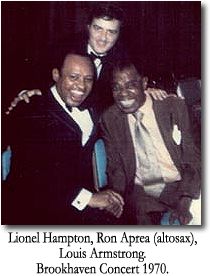 In 1930, Hampton was called in to a recording session
with Armstrong, and during a break Hampton walked over to a
vibraphone and started to play. He ended up playing the vibes on one song. The
song became a hit; Hampton had introduced a new voice to jazz and he quickly
became "King of the Vibes". In 1930, Hampton was called in to a recording session
with Armstrong, and during a break Hampton walked over to a
vibraphone and started to play. He ended up playing the vibes on one song. The
song became a hit; Hampton had introduced a new voice to jazz and he quickly
became "King of the Vibes".
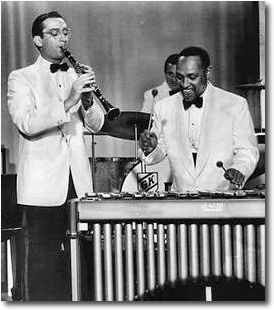 When Benny Goodman heard him
play, Goodman immediately asked Hampton to record with him, Gene
Krupa on drums and Teddy Wilson on piano. The
Benny Goodman Quartet recorded the jazz classics "Dinah," "Moonglow," "My Last
Affair," and "Exactly Like
You." Hampton's addition to the group in 1936 also marked the breaking of the color
barrier; the Benny Goodman Quartet was the first racially integrated
group of jazz musicians. When Benny Goodman heard him
play, Goodman immediately asked Hampton to record with him, Gene
Krupa on drums and Teddy Wilson on piano. The
Benny Goodman Quartet recorded the jazz classics "Dinah," "Moonglow," "My Last
Affair," and "Exactly Like
You." Hampton's addition to the group in 1936 also marked the breaking of the color
barrier; the Benny Goodman Quartet was the first racially integrated
group of jazz musicians.
He toured with the all-white
Goodman orchestra during a time when it was not an acceptable practice to book
integrated groups in American music venues. It was an era when black musicians
were not welcome and it was difficult finding establishments that would
accommodate them for lodging. However, through Goodman's insistance it was
arranged that Hampton would travel with him.
Hampton's long time manager Phil
Leshin remarked that Hampton later said, "I didn't recognize that
it was a social advancement, but it was the first time blacks and whites ever
played together out in public.".
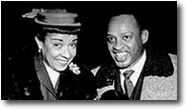 Hampton married his wife, Gladys on
Nov. 11, 1936. Serving as his
personal manager, Gladys developed a reputation as a brilliant businesswoman. It
was she who was responsible for raising the funds to start the Lionel
Hampton Orchestra. Hampton married his wife, Gladys on
Nov. 11, 1936. Serving as his
personal manager, Gladys developed a reputation as a brilliant businesswoman. It
was she who was responsible for raising the funds to start the Lionel
Hampton Orchestra.
The Lionel Hampton
Orchestra became known around the world for its tremendous energy, dazzling
showmanship and first-class jazz musicianship. "Sunny Side of the Street," "Central Avenue Breakdown," his signature tune,
"Flying Home," and "Hamp's Boogie-Woogie" all became top-of-the-chart
best-sellers upon release and the name Lionel Hampton became world famous
overnight. The Lionel Hampton Orchestra had a phenomenal array of sidemen.
The frenetic jazz vibraphonist and
mentor to countless musical careers. The orchestra also initiated the first
phase of Hampton's career as an educator by showcasing and graduating the
talents of future jazz giants that included the "Crown Prince of Bebop"
Charlie Parker, music industry mogul, producer/arranger
Quincy Jones, bassist Charlie Mingus,
saxophonists Dexter Gordon and Illinois
Jacquet, young trumpeter Fats Navarro, singers
Lilly Mae Jones who became Betty Carter, Joe
Williams and Ruth Jones from Chicago who was known
worldwide as the "Queen of the Blues" Dinah Washington
as well as Cat Anderson, Art Farmer,
Clifford Brown, Clark
Terry, Charles Mingus, Wes Montgomery
and many others who became known around the world for first-class jazz
musicianship.
Hampton sustained a presence
on the American stage that spanned a minimum of six-decades. Performing year
round, the tremendously energetic vibraphonist was known not only for his
phenominal energy, but also for directing bands that were among the most
long-lived and popular large ensembles in jazz history.
Writing more than 200 musical pieces and
recording hundreds of records that included "Evil
Gal Blues" and "Midnight
Sun." His talent in the symphonic field is highly respected. He
composed two major symphonic works, "King David
Suite" and "Blues
Suite" which are performed often by leading orchestras
throughout the world.
Touring
internationally over the last 30 years playing jazz standards on the metal keys
of the vibraphone with soft mallets producing vibrating tones and excitement
among audiences, Hampton once said in an interview, that he estimated that he
performed his award winning composition and signature tune "Flyin' Home," more than 300 times a year from
1937 to 1987. Hampton who was once a drummer,
played the vibraphone with lightning speed and with a sense of simplistic
harmony and melody coupled with a driving rhythm that was fierce and
firery.
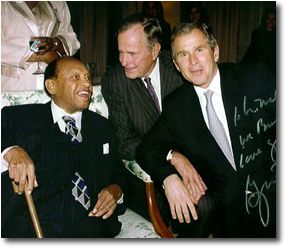 As a
statesman, he was asked by President Eisenhower to serve under
the title of American Goodwill Ambassador for the United States. An
honor also bestowed upon him by President Richard Nixon. His
orchestra made many tours to Europe, Africa, the Middle East, and the Far East,
generating a huge international following. President George Bush
Sr. appointed him to the Board of the Kennedy
Center. As a
statesman, he was asked by President Eisenhower to serve under
the title of American Goodwill Ambassador for the United States. An
honor also bestowed upon him by President Richard Nixon. His
orchestra made many tours to Europe, Africa, the Middle East, and the Far East,
generating a huge international following. President George Bush
Sr. appointed him to the Board of the Kennedy
Center.
A long time member of the
Republican Party, Hampton appeared at fund-raising and celebratory
party events, but played the White House during Democratic administrations too.
He performed throughout his stellar career, Hampton has played and performed for
Presidents Truman, Eisenhower,
Johnson, Nixon, Carter,
Reagan and Bush. President Clinton
awarded him the National Medal of the Arts and hailed him as
"more than just a performer. He is a lion of American music. And he still
makes the vibraphone sing.''
Over the years, the legendary
Hampton has received other innumerable prestigious awards. Among them: The
Papal Medal from Pope Paul I, Sixteen Honorary
Doctorates, and in 1992 the highly
esteemed Kennedy Center Honors Award, in which he shared the musical
distinction with Mstislav
Rostropovich.
As a businessman, the
American music icon established two record labels, his own publishing company,
and he founded the Lionel Hampton Development Corporation to build
low-income housing in Harlem, NY (The Lionel & Gladys Hampton Houses on
St. Nicholas Avenue) and other inner cities around the United States.
Despite the rigorous demands of his exciting and very full calendar, Hampton
continued to amaze those in the music business with the care and time he devoted
to his many public service projects. He had a "dream" that he would aid in the
creation of a university in Uptown (Harlem) New York "...where young Black
kids can learn to be Doctors, Lawyers, IBM technicians, and, maybe even
musicians..."
A street
in Berlin, Hamptonstrasse, and a music school in Idaho at the
University of Idaho have been named in his honor. In his continuing role as an
educator, he began working with University of Idaho in the early 1980s to establish his dream for the
future of music education. In 1985,
the University named its jazz festival for him, and in 1987 the University's music school was
named the Lionel Hampton School of Music. Nearly 20 years later, the
University of Idaho has developed an unprecedented relationship with Hampton by
ensuring that his vision lives through the Lionel Hampton Center,  a
$60 million project that will provide a "home for jazz," housing the
university's Jazz Festival, its School of Music, and its
International Jazz Collections, all designed to help teach and preserve
the heritage of jazz. a
$60 million project that will provide a "home for jazz," housing the
university's Jazz Festival, its School of Music, and its
International Jazz Collections, all designed to help teach and preserve
the heritage of jazz.
The school is the first
university music school to be named in honor of a jazz
musician.
Former President George Bush
says "Lionel was a dear friend of Barbara's and mine for over 40
years. Lionel Hampton was a national treasure. His career represents the very
heart and soul of America's music, jazz. That heritage is something we as a
nation need to preserve and cherish for generations to come. The Lionel Hampton
Center at the University of Idaho will open doors of learning even further for
jazz musicians and scholars of all ages..."
His lifetime of "swinging" is well documented
through hundreds of recordings, many of which rank among the best in jazz, and
all of which will be housed and studied inside the Lionel Hampton Center
in Moscow, Idaho, slated to open in 2006.
Tamm E Hunt
Insert a commment
© 2000 -
2003 Jazzitalia.net - Tamm E Hunt - All rights reserved
|
© 2000 - 2026 All the material published on Jazzitalia is exclusively owned by the author. Moreover it is protected by International Copyright, so it is forbidden any use of it which isn't authorised by the rights' owner.
|
Questa pagina è stata visitata 4.846 volte
Data ultima modifica: 12/04/2003

|
|

